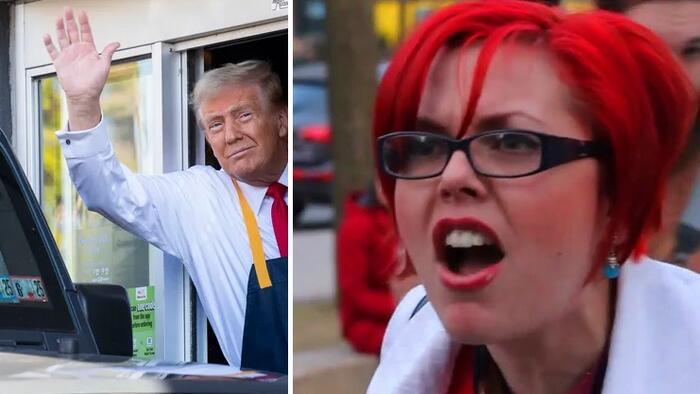On Sunday, Donald Trump made headlines by parodying Kamala Harris’ questionable statement about her past at McDonald’s. He visited a McDonald’s in Bucks County, Pennsylvania, and participated in making fries while also working the drive-thru. This playful jab at the Vice President was documented on social media, where images and videos of Trump serving perfect fries and interacting with a Fox 29 Philly crew were shared widely. This light-hearted event showcased Trump’s ability to engage with his supporters in a humorous way, particularly as the 2024 election campaign heats up.
The playful exchange escalated with various memes and videos surfacing online, including a new ad featuring Trump at McDonald’s. Many on the right viewed Trump’s actions as an entertaining publicity stunt that creatively poked fun at Harris, generating significant buzz just before the election. Conversely, the left responded with criticism and hostility, unsure how to navigate Trump’s light-hearted mockery of one of their key figures. This mismatch in reactions underscored the intense partisanship present in contemporary American politics.
Critics of Trump seized on the event to condemn it, with some suggesting that the closed McDonald’s was indicative of a staged performance. The criticism reached absurd levels, with commentators on social media expressing outrage and disbelief over Trump’s antics. A notable critique came from Seth Abramson, who suggested that Trump’s actions symbolized a decline in political decorum, labeling the whole event as “grotesquely embarrassing.” Such responses highlighted a deep-seated animosity for Trump and his methods, illustrating the heightened tensions in political discourse.
Supporters, however, embraced the event as a moment of victory, arguing that Trump’s actions triggered a cacophony of backlash from the left. They shared their enthusiasm across various platforms, celebrating what they perceived as a clever and effective political move. Figures like Jase and Jack Posobiec welcomed the reactions from the left, viewing them as evidence that Trump’s parody had struck a nerve. These supporters reveled in the chaos created by Trump’s publicity stunt, indicating a clear divide in perception between Democrat and Republican audiences.
Political figures also weighed in on the controversy, with Minnesota Governor Tim Walz questioning Trump’s actions while defending Harris. Walz pointedly remarked on Trump’s history with workers’ rights, contrasting it with Harris’s genuine commitment to workers’ welfare. Despite the playful nature of the McDonald’s incident, Walz’s remarks reflected underlying tensions about labor and economic policies that are important to the electorate as the election approaches. This narrative served to reinforce political identities and allegiances ahead of the 2024 presidential race.
Amidst the political theater, instances of unintended humor arose, such as a misguided tweet from David Frum, who mistakenly conflated frying with grilling. This misstep only added to the chaotic narrative surrounding the event and served as a reminder of the sometimes comical nature of political discourse today. Overall, Trump’s McDonald’s visit highlighted not just a moment of levity in a contentious campaign environment, but also the ways in which humor can stoke deeply polarized sentiments among the American public. Thus, this seemingly light-hearted episode encapsulated the intricate dance of strategy, media, and public perception that defines modern politics.

